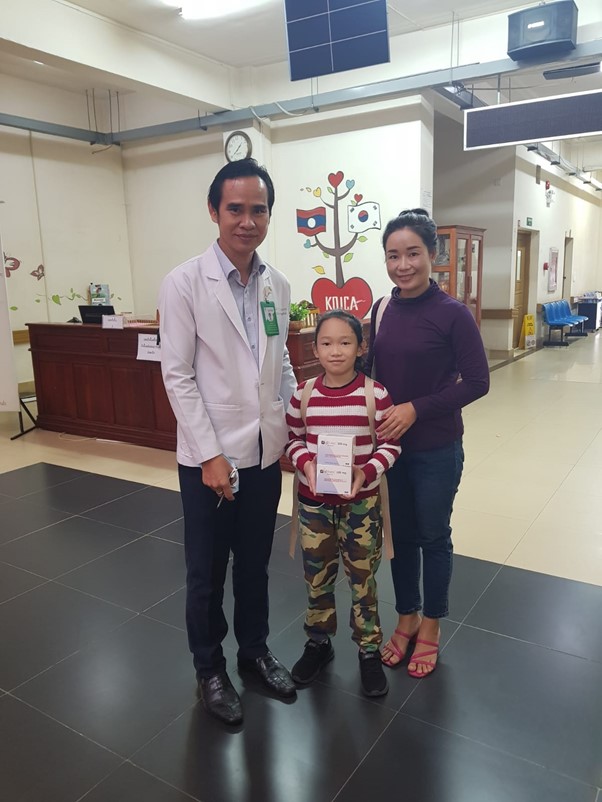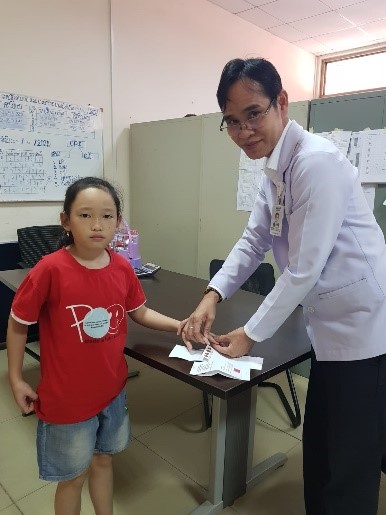After weeks of anxious anticipation, February 10, 2023, was a day of incredible joy for us as the first shipment of medication successfully arrived in our partner hospital in Laos and soon into the welcoming hands of the patients – specifically young Ammonlath!
Journey kicks off!
Our journey started a year ago, in Jan 2022, when we first looked into the idea of launching MAS in Laos to provide treatment to CML patients in Laos. After reaching out to several contacts in the healthcare sector, we were lucky to have our colleague in The Max Foundation, Wirat Saekuai, connect us to the Mittaphab Hospital’s doctors, Dr. Champadeng and Dr. Sonephet. In March 2022, we had our first call with the physician team. We introduced The Max Foundation, and explained our programs and how we operated as an organization. The concept of providing ongoing treatment access for a longer term (over and above a one-time donation) appeared to be very new to the doctors. They needed to discuss the matter internally and consult with the Ministry of Health (MoH). Several emails followed between us and Mittaphab and we gradually started to feel hopeful.
Roadblock already?
In early Jun 2022, Dr. Champadeng arranged another call between us, this time, involving local authorities including the MoH. We could see they took our request seriously. In attendance was the hospital director, two hematologists, one oncologist, a representative from the LAOS PDR Ministry of Foreign Affairs (MoFA), and a representative from MoH. Once again, we briefed the team on The Max Foundation, and explained who we were, our purpose, what we did, and how we operated. The authorities, while acknowledging Max’s efforts to support cancer patients in the country emphasized that there were existing protocols and regulations that Max had to follow.
Amongst a long list of applications that had to be completed was an application to establish a representative office in the country. Despite our best efforts to demonstrate that Max was not going to establish an office in-country, we were still required to follow their very strict protocols, we were told. We explained that our primary objective was to partner with a local hospital and/or local authorities and doctors so together we could provide lifesaving medication to eligible patients. While the Laos authorities were friendly and supportive, they were constrained by their own rules. They advised us to submit the requirement that outlined the existing regulations (focusing on establishing a local representative office as the first step) via the Laos PDR embassy in the US.
Following this meeting, Mei Ching and I felt like we had hit a roadblock. We knew if we decided to follow the existing regulations, the process would likely take forever while patients continued to wait and worse still, could end up losing their lives in the interim. There were already CML patients identified in the countries who were getting medicines but had to pay out of pocket. Physicians frankly admitted that these patients were not able to adhere to their daily dosage since they lacked the financial ability to purchase the medicines on an ongoing basis.
Changing lanes!
This did it, we refused to accept that there could only be one way to get much-needed medicines into the hands of patients in Laos. We questioned our earlier approach. Had we approached the health authorities too quickly? Could it be that the concept of an on-going support program with patient data tracking was so new that governing bodies with responsibility to approve the approach couldn’t do so?
Through follow-up conversations with the physicians we found out that they normally only received one-time bulk donations of medication and had no experience engaging in a long-term on-going partnership with an NGO with a well-set-up program. They also had no expertise in managing import permits because historically, one-off donations that they received were managed directly by the MoH, another barrier we had not been aware of.
Mei Ching and I started to brainstorm ideas. The responsible Laos authorities didn’t know us or our program completely. What if we could allow the positive impact that Max could bring for patients (and physicians) speak for itself? What if we worked at the hospital level, educating the hospital director & leadership team that The Max Foundation had the life-saving medications that would benefit Laos patients and through the partnership, the medication would be donated free of cost. We suggested that it might be helpful if the hospital reached out to the MoH to explain to them that it was their intention to cooperate with the Max Foundation. This strategy, effectively, put the onus on the hospital to take responsibility to arrange for government approvals for our partnership. Dr. Champedang agreed to the idea and wrote a letter of intent to the MoH. After much follow-up between the hospital, MoH and MoFa, we finally received the MAS MoU signed by the Director of the hospital in late Nov 2022.
Not taking No for an answer!
During the process, Dr. Champadeng asked me repeatedly for information regarding the total amount of drugs and the shipping documents. I explained to him that first, we needed to identify a doctor (Haematologist) to work with us to manage the CML patients in the program. Then, secondly, the patients’ applications needed to be submitted through our Patient Tracking System with the required documents. He referred me to Dr. Sonephet, a pediatric hematologist, who has now become our partner doctor. I collected Dr. Sonephet’s medical license and other paperwork in order to register him in MAS. At the same time, I worked with Dr. Champadeng to collect the Institution Partner Applications as well as the hospital validation document.
For a patient to be eligible for our program, one of the most important documents they need to provide is the diagnostic test result (BCR-ABL positive or Philadelphia chromosome-positive). No such confirmation test can be done in-country. After my explanation and discussions with Dr. Sonephet, we decided to provide Spot On material for four CML children under his care. These children were treated as CML patients. He wanted to put them on Glivec. In October 2022, the Spot On results came back showing all four children were BCR-ABL positive.
The partnering institution was approved in PATs in November 2022. I remember this moment well. I was in a hotel room in Cambodia on a call with Dr. Sonephet guiding him to log into PATs for the first time, to change his password and sign the product label. It took over an hour just to change the password as he admitted he was not good at computing and the slow unstable internet connection wasn’t helpful.
It took time and patience, but I started to slowly guide Dr. Sonephet to submit applications in PATs. Since the internet connection at the hospital isn’t good, he would try to log into PATs during the night when he got home and had time. Knowing the critical nature of what we were trying to achieve, I offered him my support fully asking that he call me night or day. I received his message at 10:30 pm that day to notify me that he had completed submitting the four applications in PATs.
Resourceful partnering
Regarding supply chain issues, there were several questions that came up which Mei Ching, the doctors and I could not answer. Would the doctor successfully obtain the import permit? What about the tax waiver? Do they need to apply for it before we sent the shipment over? Were there any additional steps they needed to take for customs clearance?
The truth of the matter was simply that no one knew all the answers and we just needed to work together to find solutions and be resourceful. Everyone including the physicians, was willing to collaborate to ensure a successful shipment since we were talking about saving lives.
Why was I so overjoyed and ‘over the moon’ when the first shipment was successfully completed? Because there were so many unknowns which made me nervous. I learned to trust the process and have faith in the doctors who wanted nothing else but to provide help to their patients.
The import process was amazingly smooth:
- 2nd December 2022 – We sent physicians the shipping documents.
- 21st December 2022 – The import permit was provided.
- 28th December 2022 – The consignment was sent out.
- 10th January 2023 – Our partner physician received the medication, and
- 11th January 2023 – OUR FIRST PATIENT, CHANPAENG, RECEIVED THE MEDICATION.
Going to the unknown is how you expand what is known!
Looking back over our journey I feel like we walked into a forest on a misty day. We couldn’t see what was ahead of us. We could only take one small step, at a time. There were many “what ifs” that popped up in the conversations between Mei Ching and I but it was never ever a “what if it is too difficult”. I’m grateful that the doctors who never knew us before 25th March 2022 decided to place their full trust in the Max Foundation and our work.
There is a saying I think best expresses this situation. “Going to the unknown is how you expand what is known.” Deep inside we were always crystal clear that “what is known” is that if we were successful in our efforts, many patients and their families would get a second chance at life. And that kept us motivated and energized as we traveled the road less traveled – to Laos.


